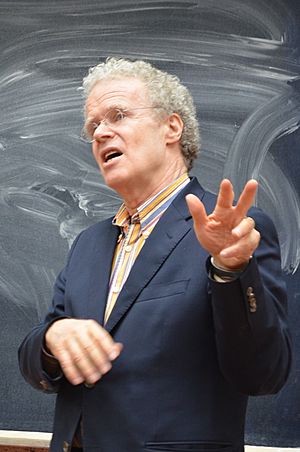Erik Olin Wright facts for kids
Quick facts for kids
Erik Olin Wright
|
|
|---|---|

Wright lecturing at Kyiv University in 2013
|
|
| Born | February 9, 1947 Berkeley, California, US
|
| Died | January 23, 2019 (aged 71) |
| Alma mater | |
| Spouse(s) |
Marcia Kahn Wright
(m. 1971) |
| Scientific career | |
| Institutions | University of Wisconsin–Madison (1976–2019) |
| Thesis | Class Structure and Income Inequality (1976) |
| Doctoral advisor | Arthur Stinchcombe |
| Other academic advisors | Michael Reich |
| Doctoral students |
|
| Other notable students |
|
| Influences |
|
Erik Olin Wright (born February 9, 1947 – died January 23, 2019) was an American sociologist. He taught at the University of Wisconsin–Madison. He studied how society is divided into different groups, called social stratification. He also looked at ideas for a more equal future beyond capitalism.
Wright was known for his new ideas about the working class. He thought it was made of different subgroups with varying levels of power. This changed how people understood class consciousness, which is how aware people are of their social class. He also came up with ideas like "deep democracy" and "interstitial revolution."
Contents
About Erik Olin Wright
Early Life and Schooling
Erik Olin Wright was born in Berkeley, California, on February 9, 1947. He grew up in Lawrence, Kansas. His parents were both psychology professors.
He earned two Bachelor of Arts degrees. The first was from Harvard College in 1968. The second was from Balliol College at the University of Oxford in 1970. In 1976, he earned his Ph.D. in sociology from the University of California, Berkeley. That same year, he started teaching at the University of Wisconsin–Madison.
His Career in Sociology
Wright began his career in the mid-1970s. This was a time when many young thinkers were inspired by events like the Vietnam War and the civil rights movement.
At the University of Wisconsin–Madison, Wright guided many students. These students later became important sociologists and even politicians. Some of his notable students include Wilmot James and Vivek Chibber. He also helped scholars like Gøsta Esping-Andersen and Eduardo Bonilla-Silva.
In 2012, Wright was chosen to be the President of the American Sociological Association. This is a big honor for sociologists in the United States.
Personal Life
Outside of his academic work, Wright loved playing the fiddle. He often encouraged his friends to square dance at parties.
Erik Olin Wright passed away on January 23, 2019. He was 71 years old. He died from acute myeloid leukemia in a hospital in Milwaukee, Wisconsin.
Wright's Main Ideas
Understanding Social Classes
Wright was known as an important thinker of the "new left." His main work focused on studying social classes. He wanted to update the idea of class from Marxist thinking. This way, researchers could better understand how class affects people's lives. This includes their income, living conditions, and even their political views.
Wright believed that several things define "class":
- Who controls important resources.
- A person's role in how things are produced.
- Their skills and value in the job market.
- How much income they get from resources.
- How much control they have over their work.
He also looked at people like experts, skilled workers, and managers. Even though they are not business owners, they often have more advantages than other workers. This is because their skills are in high demand. Employers might pay them more or give them more freedom. This often makes their interests closer to the employers' than to other workers.
One of his famous books is Class Counts: Comparative Studies in Class Analysis (1997). In this book, he used information from different countries.
Real Utopias: A Better Future
Later in his career, Wright explored a new idea of socialism. He believed in creating "real utopias." These are practical ways to build a more fair and democratic world. They work by using democratic and equal principles.
He wrote a book called Envisioning Real Utopias in 2010. In this book, he used Wikipedia as an example of a "real utopia." He saw Wikipedia as a way for people to work together and share knowledge freely. Another example he used was the Mondragon Corporation, a group of worker cooperatives.
See also
 In Spanish: Erik Olin Wright para niños
In Spanish: Erik Olin Wright para niños
- Theory of historical trajectory

